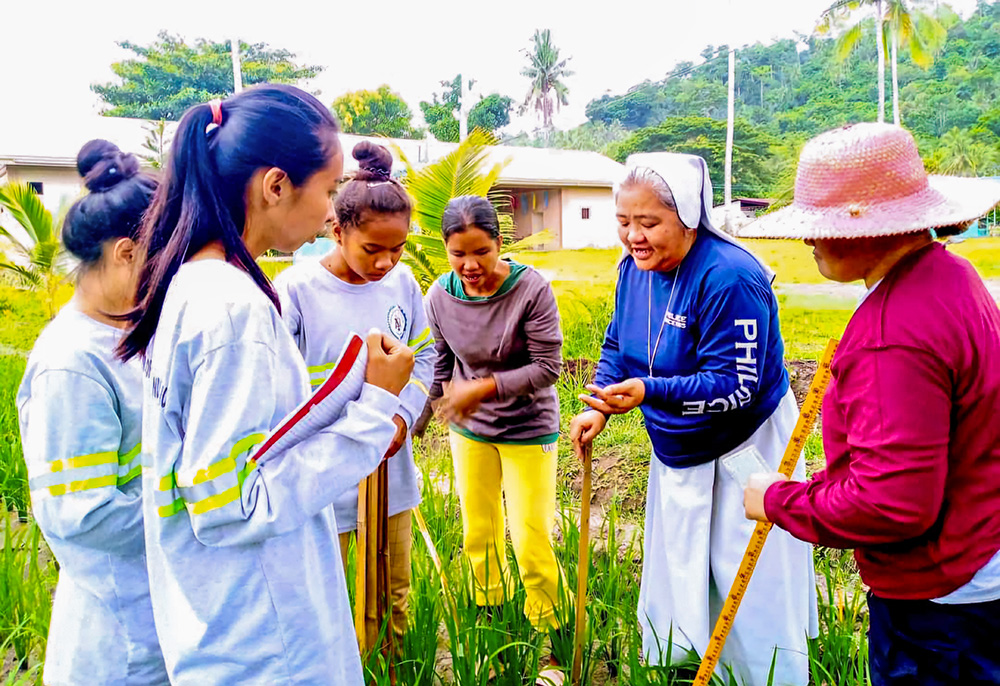
Salesian Sr. Ailyn Cayanan facilitates an agro-ecosystem analysis, part of a research-based study on the quality of inbred rice, seed certification and mechanization. (Courtesy of Ailyn Cayanan)
Sr. Ailyn Cayanan, a Daughter of Mary Help of Christians, is a technical directress of an agricultural school called Mary Help of Christians School - Mindoro Inc. in Calapan City, Philippines.
She is remarkably engaged in the education of young people, especially Indigenous peoples and the poor. The goal of her school is to transmit skills and agricultural training based on technology, to support and invigorate their families.
This year, on May 3, in Yogyakarta, Indonesia, she received a BELLA 2024 Award for Asia as an entrepreneur in the field of agricultural education from the Asia Center for Small Business, an organization that promotes sustainable growth of small and medium-sized enterprises in Asia with a focus on agriculture, women and technological enterprises.
The acronym BELLA stands for Business Excellence in Lady-Led Agri-enterprise. The award celebrates the achievements and contributions of women who take significant steps in the promotion of sustainability, according to the criteria of people, planet and well-being. It's a platform that is meant to inspire more women to assume leadership roles in the agricultural sector with the goal of creating a more sustainable future for all.
Cayanan agreed to an interview with Global Sisters Report to speak about it.
_____
GSR: What was your initial reaction when you learned you won the Bella 2024 Award? Were you surprised?
Cayanan: Winning the Bella 2024 Award felt like receiving a wonderful gift from heaven, a divine caress from God. It was a series of surprises that unfolded each day.
My first communication with the Asia Committee for Small Business – Philippines was about the nomination by the Department of Agriculture and the Philippine Center for Entrepreneurship (Go Negosyo) for the category of Agriculture Education for Womenpreneurship. I felt humbled and grateful for their trust and confidence.
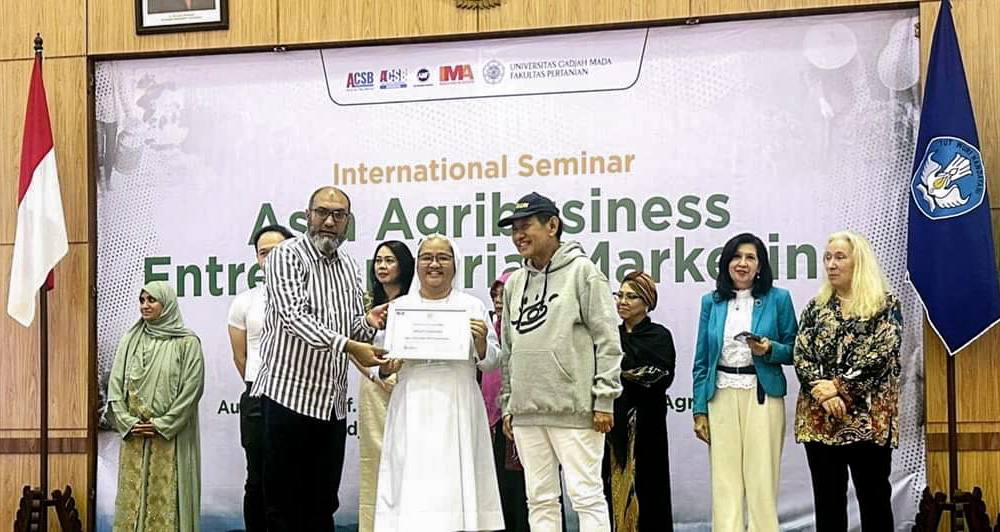
Sr. Ailyn Cayanan receives the BELLA Award for Asia in Yogyakarta, Indonesia, on May 3 for her entrepreneurial efforts in the field of agricultural education (Courtesy of Ailyn Cayanan)
The next email I received was a congratulatory letter, informing me that I had won the category at the Philippines level. It was an incredible feeling, and I tried to savor the moment. Along with the letter was an invitation to attend the awarding ceremony in Yogyakarta, Indonesia. Later, I received a call explaining the award and the qualification for the next level, the Bella Asia Award.
Before leaving for Indonesia, I was interviewed via Zoom by the Asian organizers. On May 3, as soon as I arrived ... the organizers welcomed me and gave me the news that I had won the Asia Bella Award 2024. The feeling I recall from that moment was one of overwhelming joy and deep gratitude for the unexpected recognition.
What kind of efforts have you undertaken in agricultural education to receive the BELLA 2024 Award for Asia as an entrepreneur in this field?
To give you a comprehensive understanding of my agricultural education journey, let me walk you through the efforts that led to receiving the BELLA 2024 Award for Asia as an entrepreneur in this field. When I first assumed the role of technical directress at Mary Help of Christians School (Mindoro) Inc. in 2019, the school was experiencing a decline in enrollment and its financial status was in the red. In 2018, there were only two graduates.
On my first day, I gathered the members of the educating community, including sisters, trainers, stakeholders and past students. Instead of focusing on problems, we began envisioning our ideal agricultural school and set our goals accordingly.
This effort paid off, as in 2019, we were initially provided 222 scholarships for trainees, which has now increased to 700. While developing their agricultural skills, trainees receive additional allowances from the government based on their enrolled programs.
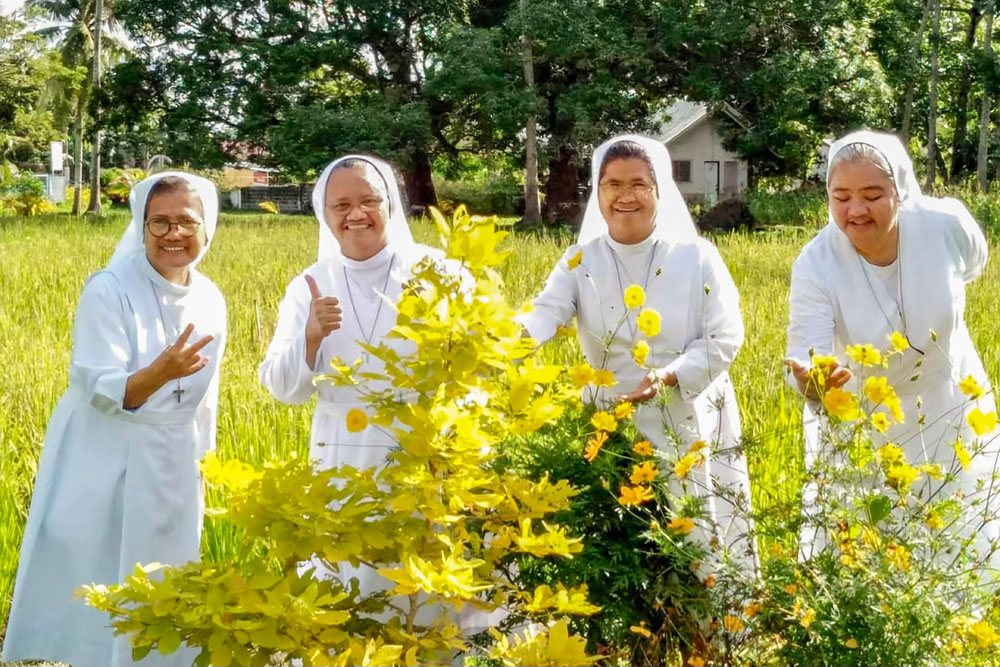
Members of the community of Daughters of Mary Help of Christians, from left: Srs. Nancy Esmero, Clara Alacapa, Jacinta Inquillo and Ailyn Cayanan (Courtesy of Ailyn Cayanan)
Additionally, they earn 20% of the school's annual farm earnings while working on the school farm.
I spearheaded the redesign of the curriculum and holistic training programs, creating a significant impact on the lives of trainers, trainees and the community. I inherited three agricultural qualifications from previous administrators, which migrated from one source; currently, we are offering 12 courses.
Trainees graduating from our program confidently share their knowledge and gain a competitive edge in the job market. Our community-based program benefits villages, tribes and farmers by enabling them to identify, share and implement sustainable environmental farming practices through the Organic Farming Program on their farmlands.
This program increases awareness of their contributions towards sustainable livelihoods and responsible stewardship of the Earth, reducing greenhouse gases, conserving water and energy and more so forming them to be people with values and well-founded Christian character.
Why is the promotion of agricultural education important? Why are you so passionate about it? And can you tell us how Mary Help of Christians School of Calapan City, Mindoro, is engaged in the education of young people, especially Indigenous peoples and the poor?
The province of Oriental Mindoro is endowed with an abundant and rich agriculture base. It is famous for its arable land, becoming known as the rice granary and fruit basket of Southern Tagalog. The backbone of the province is its agriculture. With a total population of 908,339 by the Philippine Statistics Authority, 70% of its population are engaged in agriculture and fishing.
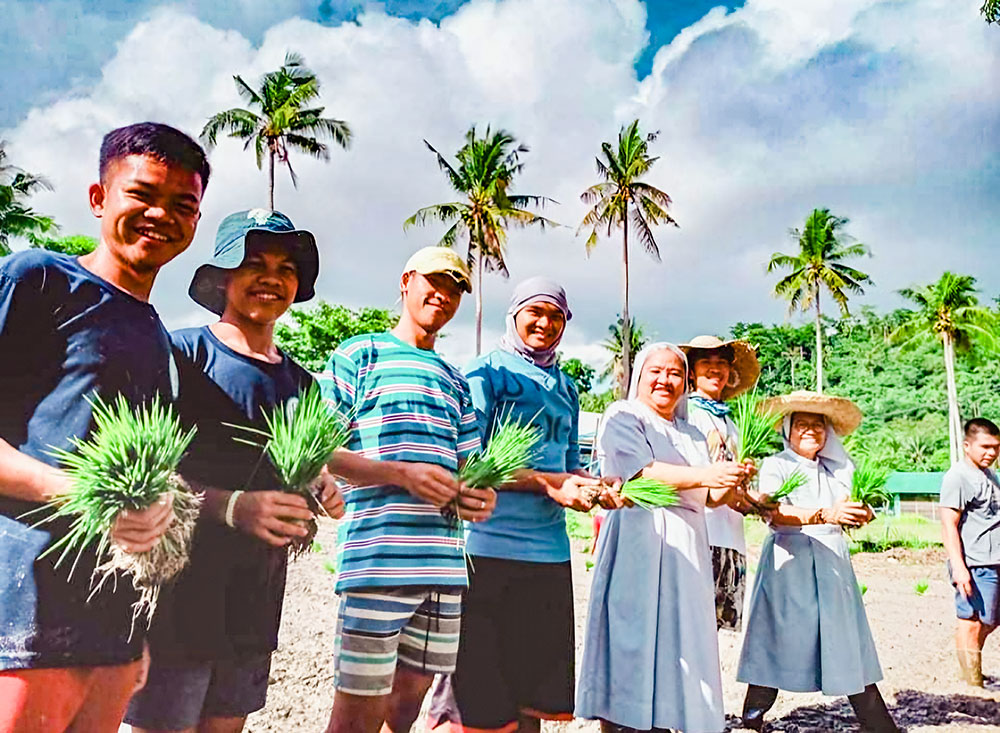
A community endeavor practicing traditional rice planting (Courtesy of Ailyn Cayanan)
Given this background, most of our people, including the Indigenous population, are engaged in agriculture.
As a leader and an institution, we believe in and advocate for holistic education, which promotes the intellectual, social, physical and spiritual growth of young people. The Salesian educational mission is based on the Preventive System of St. John Bosco, aiming to form young people into good Christians and honest and responsible citizens.
We uphold the universal value of the dignity of the human person, including the promotion of human rights, the dignity of human work, excellent work ethics, and ecological values manifested in Philippine Good Agricultural Practices such as green energy and water conservation.
Mary Help of Christians School offers a free, research- and competency-based curriculum that allows trainees, upon completion of the program, to earn multiple qualifications/certifications simultaneously.
The program, being research-based, paves the way for agricultural innovation, technology and mechanization. Moreover, MHCS trainees have a 95% employment rate, either working on other farms or tilling their own lands, while the remaining 5% pursue tertiary education.
MHCS is the only agricultural training school in Oriental Mindoro with complete facilities that offer not only a modern approach to agriculture but also a holistic formation (values formation, research-based skills training, and entrepreneurship skills) that empowers its graduates to become responsible caretakers of the Earth through family and community-building.
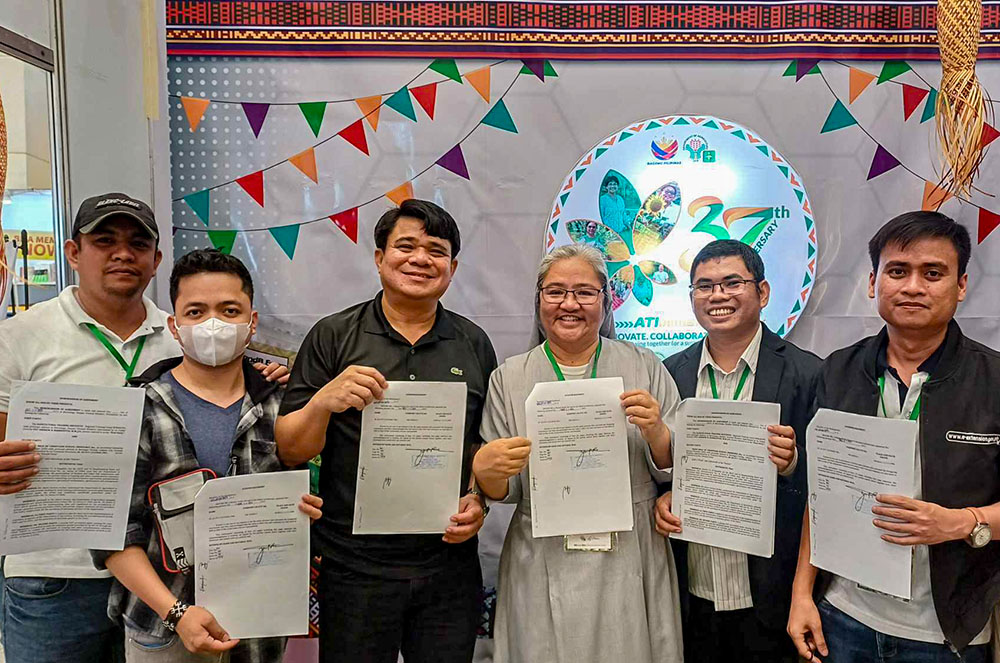
Sr. Ailyn Cayanan, along with agricultural training Institute personnel and the regional director, Pat Andrew Barrientos, sign an approved project proposal for training coconut farmers. (Courtesy of Ailyn Cayanan)
Allow me to narrate this valuable experience. I visited one of the Indigenous tribes to recruit potential trainees. The leader of the tribe bluntly commented, "In my tribe, we do not have any interest in education."
I explained the value of farming, which is their tribe's sole livelihood, and introduced our program. I assured the chieftain that we would not require them to pay for anything; their young people would be given free board and lodging, an allowance based on the program they are enrolled in, and a share of the profits from the sale of farm crops at our school. The leader agreed to give it a try and sent 10 young people for one year of training.
When they arrived at the school, they were given basic necessities because they came with only the clothes they were wearing. They were provided toiletries and school supplies. After a year, these young people graduated. Five of them found employment, and the other five returned to their ancestral land to tend their family farms.
These five who decided to go back to their communities quietly set an example of an alternative livelihood. They became entrepreneurs, supplying the needs of the village and networking with local government units for their extra produce. The proposal for organic farming became the primary livelihood, replacing the practice of charcoal making, which eradicated pollution in their village and preserved their trees for sustainability.
The following year, the tribe leader personally thanked me and asked for more slots for his tribe. Indeed, education is a powerful tool to change the mindset of a tribe and improve their way of life.
Where does sustainability come into play in your work?
Agricultural education and practices are the long-term solutions to sustainable livelihoods and food security. We believe that as long as our programs are economically sound, environmentally protective, innovative and competitive, there will always be a need for learning and teaching agriculture. While funding may be tight, I have taken advantage of opportunities to share my vision and secure support for the cause, including international humanitarian funding.
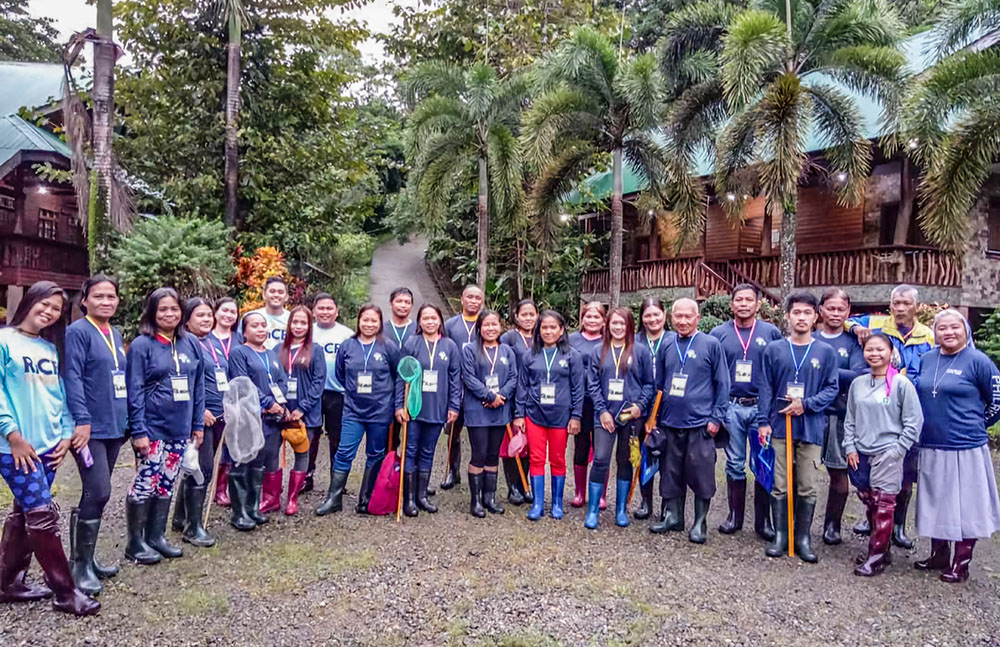
The sisters conducted a training on pest and nutrient management for farmers from the island of Romblon, Philippines. (Courtesy of Ailyn Cayanan)
How do you transmit skills and agricultural training in your school?
Transmitting skills and agricultural training at MHCS involves several steps to ensure effective learning and practical application. We follow a structured approach:
1. Curriculum design: The MHCS curriculum covers both theoretical knowledge and practical skills, integration of traditional practices and technology-based methods. Topics include soil science, crop production and management, organic pest control and fertilizer use, animal production, sustainable farming practices and agricultural entrepreneurship.
2. Hands-on learning: The school provides practical, hands-on experience through fieldwork, projects and research. Trainees actively participate in maintaining the school farm, engaging in land preparation, planting, management, harvesting, post-harvest activities and livestock rearing. Trainees also master the milling and drying programs for rice intensification and learning the operation and management of the farm machineries.
3. Workshops and demonstrations: MHCS equips its trainers by sending them to seminars and international studies and inviting foreign experts for agricultural enhancement. The school organizes workshops and demonstrations where practical insights, techniques and real-life experiences supplement classroom learning.
4. Use of technology: The redesigned curriculum integrates farm technology at MHCS. Trainees use digital farming programs such as agricultural apps for soil analysis, weather forecasting, crop management, and agroecosystem analysis. They are exposed to modern agricultural equipment, including hand tractors, four-wheel tractors, transplanters, drones and various farm tools.
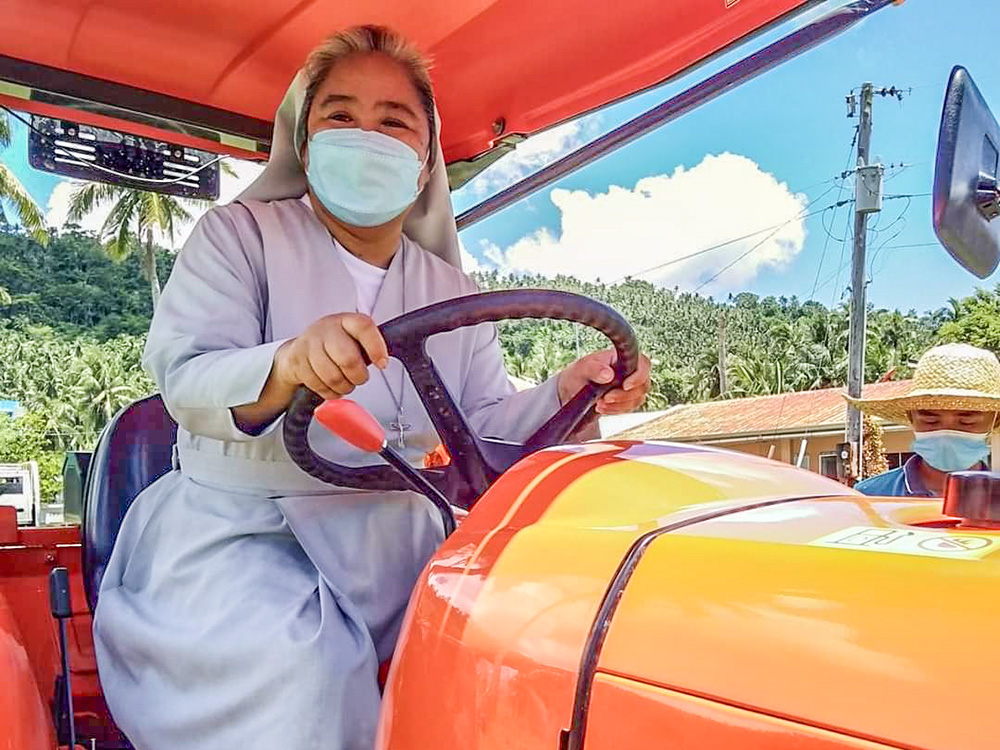
Sr. Ailyn Cayanan drives a four-wheeled tractor at Mary Help of Christians School - Mindoro Inc., while teaching rice machinery operation for national certification. (Courtesy of Ailyn Cayanan)
5. Field trips: We arrange field trips to agricultural enterprises, farms and research institutions. This gives trainees firsthand exposure to different farming methods, technologies and agricultural ecosystems.
6. Interdisciplinary approach: We connect agricultural training with the Interdisciplinary Thematic Unit, incorporating subjects like biology, chemistry, economics, mathematics and environmental studies. This interdisciplinary approach helps trainees understand the broader implications and applications of agricultural practices.
7. Skill development: We focus on developing specific skills, such as planting techniques, soil testing, organic farming methods and livestock management, allowing trainees to practice these skills under supervision.
8. Assessment: We assess trainees' gained knowledge, understanding and skills through practical exams, project reports, oral presentations, research projects and subject every trainee for national certification that is recognized at the international standard.
9. Community engagement: We encourage community involvement by inviting local farmers, agricultural cooperatives and associations to collaborate with the school. This fosters local partnerships and exposes trainees to diverse perspectives in agriculture. We respond to the needs of the community and extend our services to them where there is a need.
10. Continuous improvement: MHCS regularly updates the curriculum and training methods based on feedback, new research and technological advancements in agriculture. This ensures that the training remains relevant and effective. By implementing these strategies, MHCS effectively transmits agricultural skills and training to trainees, preparing them for careers in agriculture or simply equipping them with valuable knowledge for sustainable living.
Advertisement
Who will this training benefit the most?
Our agricultural training will benefit a diverse group of individuals and communities, including:
1. Young people: Our specialized training programs empower young people, particularly women and Indigenous individuals, by promoting inclusivity and providing them with the skills needed to participate actively in the agricultural sector. Our Salesian educational philosophy focuses on the holistic development of young people, emphasizing academic learning, moral and spiritual growth, physical development and social responsibility.
2. Farmers: We offer tailor-made programs that integrate traditional and modern farming techniques to improve crop yields, implement sustainable farming practices and manage resources more efficiently. We also provide coaching for agricultural entrepreneurship.
3. Agricultural workers: Agricultural workers benefit from advanced farming operations, modern agricultural techniques and new technologies that enhance productivity and reduce labor-intensive tasks.
4. Rural communities: By improving agricultural practices, our training boosts local economies, creates job opportunities and improves food security within rural areas.
5. Agricultural entrepreneurs: Small- and large-scale agricultural entrepreneurs benefit from meticulous training in agribusiness planning, marketing, value-adding, financial sustainability and the use of innovative agricultural technologies.
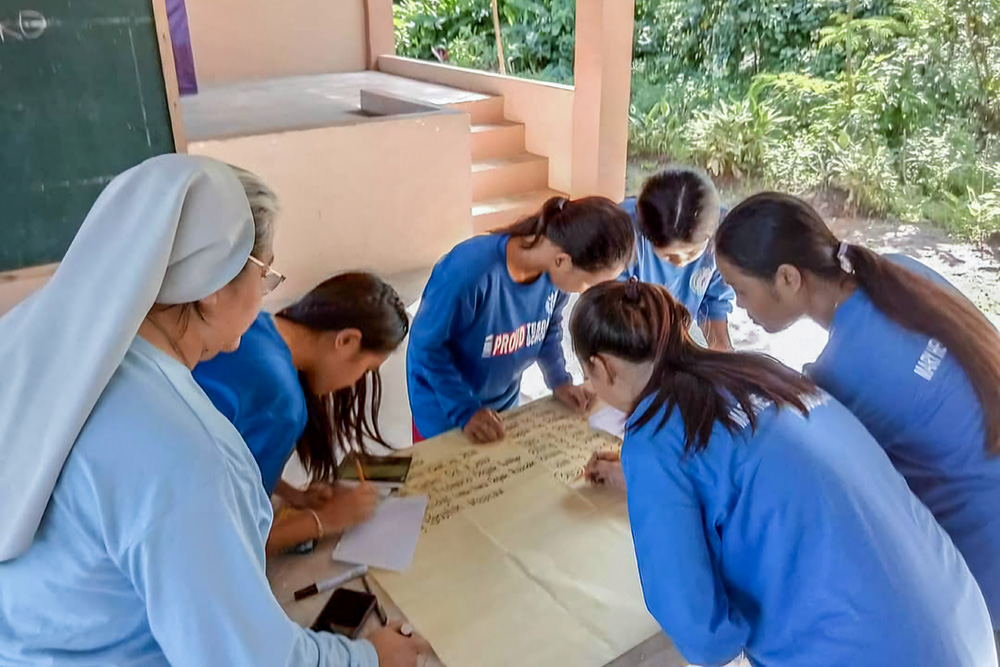
Sr. Ailyn Cayanan facilitates an agro-entrepreneurial session, coaching participants at Mary Help of Christians School - Mindoro Inc. in Calapan City, Philippines, to make their own business improvement plan. (Courtesy of Ailyn Cayanan)
6. Environmentalists: Training on sustainable farming practices helps protect natural resources, reduce environmental degradation, and promote biodiversity, benefiting those focused on environmental conservation.
7. Government units: Our training provides insights into the needs and challenges of the agricultural sector, enabling government units to create more effective policies and programs to support agricultural development for the good of farmers.
8. Schools and universities: We offer an agricultural venue ready for internships, immersion and agricultural research, providing practical insights and real-world applications of academic studies, fostering innovation and collaboration between academia and the farming community.
9. Consumers: Ultimately, consumers benefit from a secure and healthy, stable and sustainable food supply, improved food quality and potentially lower food prices due to increased efficiency and productivity in agriculture.
By addressing the needs of these various groups, our agricultural training leads to a more resilient, productive and sustainable agricultural sector, with wide-reaching positive impacts and a more caring caretaker of our mother nature.
What has been the result of your school's dedication?
Over the years, the school's dedication to its agricultural mission has produced qualified, technologically competitive and scientifically trained graduates. These individuals have become enterprising, responsible and honest young adults within their respective communities.
Our comprehensive curriculum provides trainees with a solid foundation in agriculture, equipping them with the knowledge and skills necessary for successful employment and effective management of their farms.
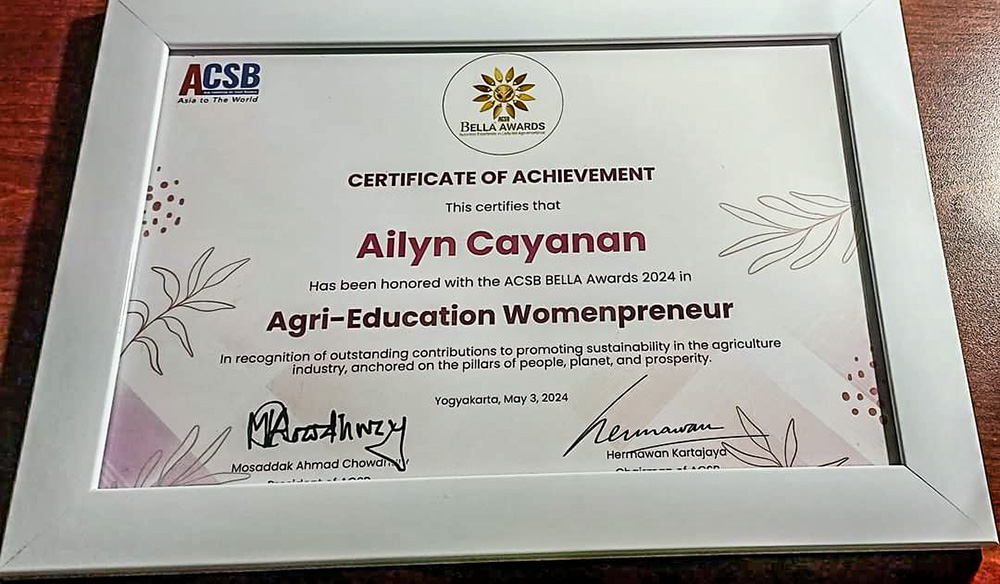
Salesian Sr. Ailyn Cayanan's BELLA Award 2024, Certificate of Achievement for in the category of Agri-Education Womenpreneur (Courtesy of Ailyn Cayanan)
As a result, many of our graduates have not only secured stable jobs in the agricultural sector but have also excelled as entrepreneurs, significantly contributing to local economies. They are well-versed in modern farming techniques, sustainable practices and innovative agricultural technologies, allowing them to enhance productivity and promote environmental conservation.
Additionally, our emphasis on values formation has instilled a strong sense of ethics and social responsibility in our graduates, making them conscientious stewards of the land and active contributors to community development.
Overall, the school's unwavering commitment to holistic education has led to the cultivation of a new generation of agricultural leaders who are poised to drive positive change and sustainability in their communities and beyond.
How can others contribute to the well-being and improvement of the school?
Volunteers can play a crucial role by sharing their knowledge and skills, thereby enriching the educational experience of our trainees.
Financial contributions can help enhance our facilities, support our programs, and provide more opportunities for trainees. Donations of equipment and materials can improve the quality of education and ensure that our trainees have access to the best tools and resources. Scholarship funding can enable more trainees, especially those from disadvantaged backgrounds, to benefit from our programs.
Project collaborations with businesses and organizations can lead to innovative programs and initiatives that provide mutual benefits. By partnering with MHCS, companies can help develop the next generation of agricultural professionals while also fulfilling their corporate social responsibility goals.
Overall, by contributing in these ways, individuals and organizations can play a significant role in promoting the well-being of our trainees and supporting the continued growth and development of MHCS.






